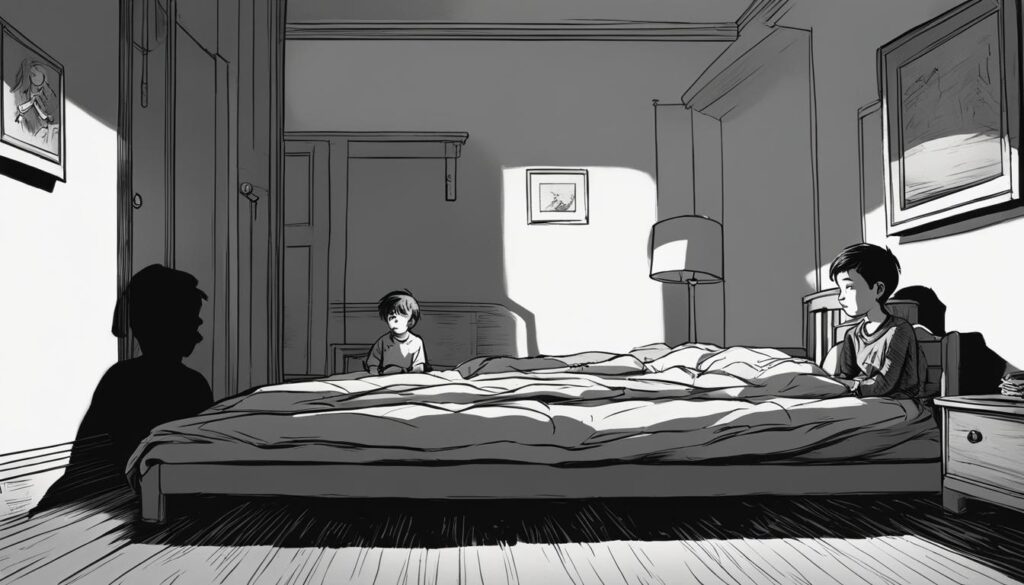Many individuals may find themselves questioning why their father doesn’t seem to like them. This article aims to explore the complexities of this issue and understand the reasons behind a strained father-child relationship. Through personal anecdotes and reflection, we will delve into the impact of parental disinterest and seek to find acceptance and peace in the face of paternal rejection.
Key Takeaways:
- Strained father-child relationships can be challenging to navigate.
- Parental disinterest can have a significant impact on an individual’s self-esteem and well-being.
- Acceptance and peace can be found by focusing on self-approval and self-acceptance.
- Understanding the limitations of a father and reframing expectations can lead to personal growth and happiness.
- Seeking external validation from a father is not necessary for one’s self-worth.
The Evolution of a Relationship
In this section, we will explore the development of a father-child relationship and how it can change over time.
As children, our fond memories with dad often shape our perception of him. He was once the center of our world, teaching us life lessons, playing games, and creating cherished moments that would forever be etched in our hearts. These childhood memories with dad hold a special place in our lives, serving as a foundation for the bond we share.
However, as time passes, the dynamics of the relationship can shift. One of the significant challenges that arise is when a blended family enters the picture. The introduction of a step-parent or step-siblings can alter priorities and change the dynamic between father and child. The once unwavering attention and connection may become diluted as new relationships demand attention and energy.
“The evolution of a father-child relationship can be complex, especially in the context of a blended family. The arrival of new family members can lead to a shift in dynamics, affecting the bond between a father and child.”
The impact of a blended family can take a toll on the bond between a father and child, causing tension, and at times, a sense of disconnectedness. It is important to navigate these changes with understanding and patience, recognizing that adjustments are necessary for the family as a whole to find harmony.
One of the significant emotions that might arise in this context is a feeling of neglect. When a father’s interest wanes or is directed towards others, it can leave a deep void and a sense of emotional distance. This lack of interest can be heart-wrenching, and it is essential to acknowledge these feelings and seek ways to address them.

Understanding these changing dynamics and the impact they have on our relationship with our father is crucial. It allows us to navigate the challenges and complexities with empathy and open communication, fostering a stronger connection amidst the shifting dynamics of a blended family.
Finding Acceptance and Moving Forward
When faced with a father’s disapproval, it is crucial to remember that our self-worth should never be dependent on his opinions or approval. We must recognize that our value as individuals goes beyond the judgments of others, including our fathers. Self-approval and self-acceptance are essential pillars in building a strong sense of identity and self-worth.
Emphasizing the importance of self-approval, we can learn to value ourselves for who we are, regardless of external validation. By acknowledging our strengths, accomplishments, and unique qualities, we can develop a sense of self-worth that is independent of our father’s approval. It is through self-approval that we find the confidence and inner resilience needed to thrive despite any parental disapproval we may encounter.
Understanding our father’s limitations is another vital aspect of finding acceptance and moving forward. Every individual has their own growth journey and capacity for emotional availability. By recognizing that our father may have his own limitations, we can reframe our expectations and let go of the need for his approval. This realization allows us to cultivate a sense of empathy and understanding, offering compassion for both our father and ourselves.
Ultimately, we can find strength and happiness by shifting the focus from seeking external approval to embracing our own growth and accomplishments. Rather than constantly seeking validation from our fathers, we can celebrate our individual journey and take pride in our personal achievements. By prioritizing our own self-development and nurturing a positive self-image, we can thrive and find fulfillment, regardless of our father’s feelings.
FAQ
Why is it common for some individuals to feel that their dad doesn’t like them?
Many individuals may feel this way due to various factors such as strained relationships, lack of interest, or conflicting priorities.
How does the father-child relationship develop and change over time?
Initially, children may have fond memories of their father being the center of their world. However, as new relationships enter the picture, priorities may shift, leading to changes in the dynamics of the father-child bond.
What impact does a blended family have on the relationship between a father and child?
Blended families can introduce complexities and challenges, which can sometimes strain the bond between a father and child. The adjustment to new family dynamics may affect the quality of the relationship.
How does a lack of interest from the father lead to feelings of neglect and emotional distance?
When a father shows disinterest or lacks involvement in a child’s life, it can create feelings of neglect and emotional distance. This can be distressing for the child, as they may yearn for their father’s attention and approval.
How can individuals find acceptance and move forward despite their father’s disapproval?
It is crucial to recognize that one’s worth is not defined by their father’s opinions or approval. Finding self-acceptance and embracing personal growth and accomplishments can bring strength and happiness independent of their father’s feelings.
Why is self-approval and self-acceptance important in the face of paternal rejection?
Seeking external validation, especially from a father who doesn’t show approval, may be a futile endeavor. Emphasizing self-approval and self-acceptance allows individuals to value themselves and build their self-worth irrespective of their father’s disapproval.
How can understanding the limitations of a father help in finding acceptance?
Understanding that every individual, including fathers, has their limitations can aid in reframing expectations. By acknowledging and accepting these limitations, individuals can find peace and release the burden of seeking unattainable approval from their father.
What should individuals focus on to find strength and happiness despite a strained relationship with their father?
Instead of fixating on seeking approval, individuals can shift their focus towards their own growth, accomplishments, and personal happiness. By valuing themselves and embracing their own journey, they can find strength and happiness independent of their father’s feelings.

